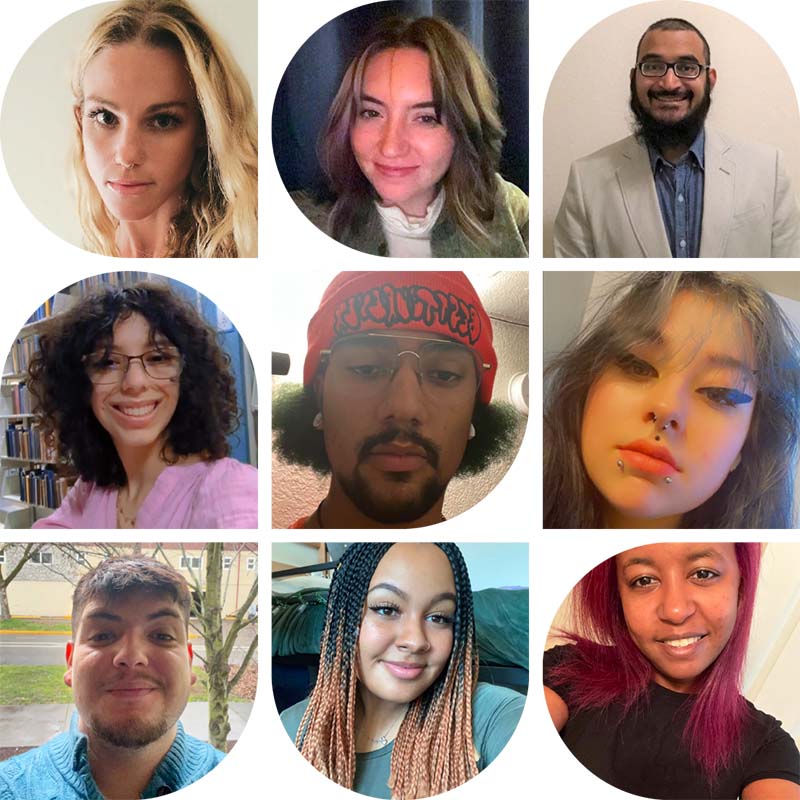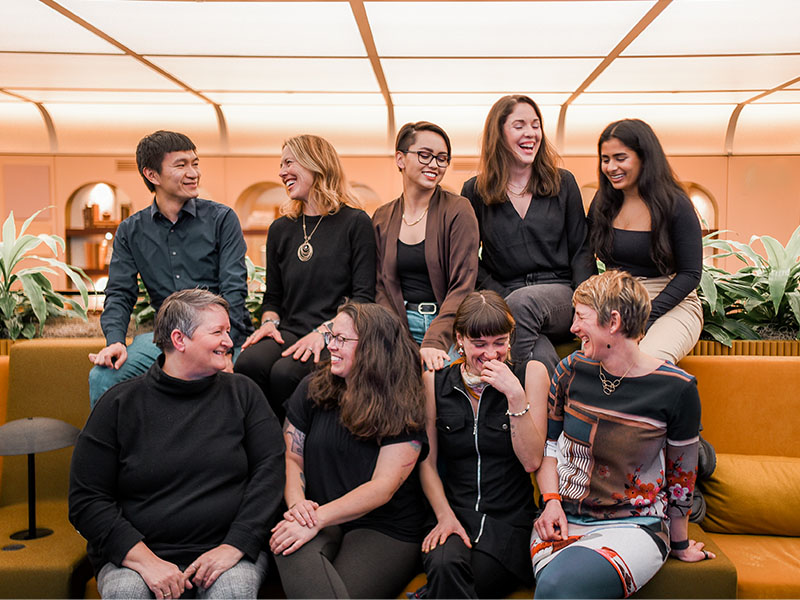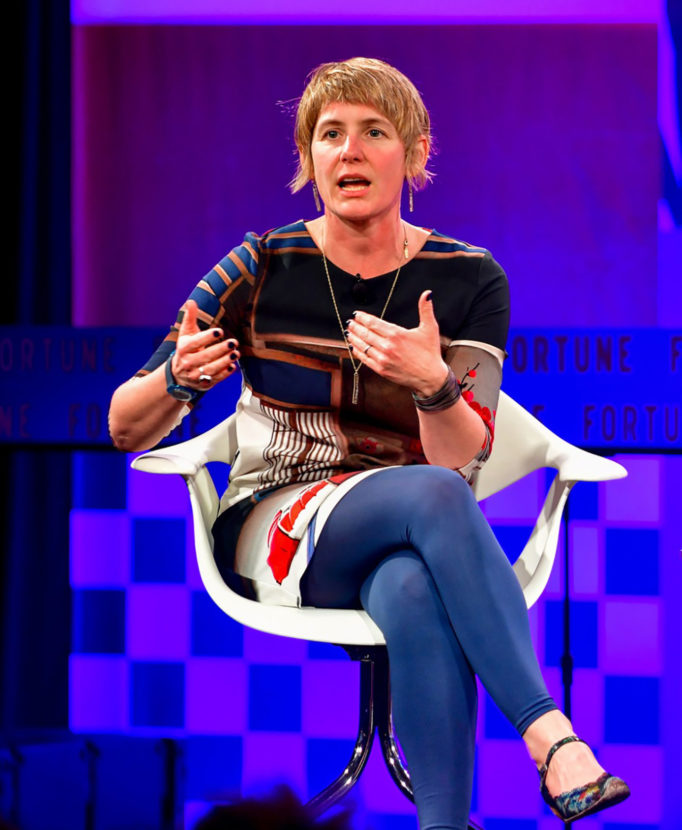Deep Dive
How to Overcome the Fear of Failure
Obi Felten is the founder/CEO of Flourish Labs, a mental health startup, and former Head of Getting Moonshots Ready for Contact with the Real World at X, Alphabet’s innovation lab. In this blog, Obi shares lessons in resilience and how to overcome the fear of failure from her personal experience of living through two decades of tech industry booms and busts, and the recent Silicon Valley Bank meltdown..
In 2001, the startup I was working for went bankrupt.
eToys.com was one of the first big failures of the dotcom boom, growing fast in the late 90s and running out of money when the market turned. I was employee #5 in Europe and loved everything about eToys: the team, the product (we sold toys!!), the colorful head office in Santa Monica, California that seemed impossibly cool compared to the grey cubicle rows in my previous job in strategy consulting, the frenetic pace, and the opportunities I was given.
In a startup you can get to do things you’re barely qualified for if you put your hand up. I led eToys into Germany aged 28, doing every job from product to marketing to office designer until I hired people for those roles. A week before the launch of the German website, the eToys board pulled the plug on the European expansion. I had to fire all the people I just hired and had sold on the ecommerce dream. A few months later, I was one of five people who shut the company down in Europe.

At Google X, half the projects my team started didn’t make it.
We were starting new projects and closing them down in an endless cycle of birth and death. Some became companies, like Mineral, Dandelion Energy and Malta. Many didn’t make it, like Loon, the internet from balloons project that inspired me to give up my Google marketing job in Europe and move to California, and Foghorn, a daring attempt to make a synthetic fuel by carbon capture which is now a Harvard business case study.

After so many failures in my career, I was still afraid of failure, but I learned how to manage through it.
The fear of failure runs deep: we’re afraid of losing face with our colleagues, our promotion, our job, our company. Fear of failure is one of the biggest impediments to innovation. It stops individuals and companies from experimenting, which is the only way to create new things. Operating from fear leads to bad decisions and bad company outcomes.
When I give talks on innovation, I share hacks and practical tips on how to overcome the fear of failure that I’ve learned over the years, for example:
- Flipping the narrative from failing fast (a useless Silicon Valley cliche) to learning fast.
- Working on the hardest part of the problem first – X calls this focusing on the monkey.
- Setting kill criteria for projects upfront, making it a less emotional decision of when to pull the plug.
- Celebrating lessons learned at all hands meetings, publishing results of failed projects
- Decoupling personal success from project success: giving bonuses to teams who shut down their own project, promoting people who did a great job even though their project failed.
- Building diverse teams to give yourself the best shot at tackling the toughest problems.
- Creating psychological safety in your team, so they tell you when things aren’t going well.
Some of these are counter-intuitive, and none are easy to do. I’ll admit that I often struggle to live up to my own principles!
In 2021, twenty years after eToys, I left Google to set up a mental health company, Flourish Labs. As a startup founder, the fear of failure is never far away.
It’s the voice in my head telling me: “I’m not good enough at product/marketing/sales/hiring/leadership to make this company a success. “I’m not spending enough time with my team/with my customers/with my family/exercising/sleeping.” “I won’t be able to raise the next round.” “The company is going to fail. “ I’m going to let the team down.”
The odds are stacked against us. 90% of startups fail in the first year. Many more fail along the way. It almost feels like a magic trick when we do succeed. As founders, we have to give confidence to our teams, our investors, our customers, all the while knowing that we might fail.
What keeps me going in my moments of doubt is the sheer scale of the problem we’re working on, coupled with an unwavering belief that we have a viable approach to addressing it. One in five Americans have a mental health diagnosis, yet over half get no care because we don’t have enough mental health providers (SAMHSA). We’re in the midst of a youth mental health crisis, with over 40 percent of high school students experiencing persistent feelings of sadness or hopelessness (CDC).
What if we train people with experience of mental health challenges to support others? That’s called peer support, an evidence based, reimbursable treatment that’s best known in the addiction space. At Flourish Labs, we use technology to scale peer support for all of mental health. We train young adults to become certified peer supporters. We then give them a job on peers.net, our telehealth platform built for and with Gen Z.

I didn’t expect our bank to fail.
All the money from our seed investment round was in Silicon Valley Bank, which started melting down on Wednesday, March 9th. On Thursday, I was in shock and denial: “This can’t be happening!” I wrestled with the prisoner’s dilemma of whether to pull our money out. By the time I decided to do it, the wire didn’t go through. On Friday, I was angry with the bank: “What were they doing???” and with myself: “I should have done the transfer earlier!” On Saturday, I was bargaining: “The only way out is to hustle for some revenue!” and wrote a pitch deck to sell peer support for interns to employers. Then despair: “It will take ages to sell this to companies, and we won’t be able to make payroll in the meantime.” I was grateful for the supportive messages from our investors, but it felt like a desperate situation.
On Sunday, my husband asked me to stop reading email, Slack, Twitter, news, and turn my phone off. I curled up on the sofa with the dog. I meditated on the fact that there was nothing I could do right now. The voice in my head started saying: “All the money’s gone. Our company’s money, and everyone else’s money. It’s not my fault.” I started thinking about all the other founders who had lost their money in SVB, and felt very connected to them. We were all in the same boat, whether we had raised $500,000 or $500 million.
Eventually I felt calm. I no longer felt anxious about what might happen, because the worst had already happened. In the Buddhist tradition there is a meditation practice where you visualise your own death. You see yourself dying. You see your family and friends grieving. You see them getting on with their lives eventually. The point of the exercise is to imagine the worst possible outcome, and come through on the other side. I had reached acceptance, the last of the seven stages of grief. I went to bed on Sunday night without turning on my phone, so I didn’t see until Monday morning that the government decided to guarantee all of SVB’s deposits, including ours, to avert a massive banking crisis.
Like many other founders, I’m still processing what happened. How I thought my company was dead, and how it came back from the dead.
What I know is this: My existential fear of failure is gone.
When the voice in my head says negative things, my system doesn’t react anymore. My stomach doesn’t constrict and my thoughts don’t start racing.
I’m grateful for the near-death experience triggered by SVB’s failure that blew up my fear. I’m not arrogant or naïve to believe that we won’t fail on many fronts. There is a famous (possibly fake) Edison quote, “I have not failed, I have just found 10,000 ways that won’t work.” It sums up the experience at an early stage startup where we run many experiments, many of which don’t work. The freedom I feel is a calm confidence knowing that whatever happens, we will figure out the next step. Or as Eleanor Roosevelt once said, “The future belongs to those who believe in the beauty of their dreams.”
Buy from startups.
Even though our money is back, we’re acting as if it’s not. In the early days of Google the CEO Eric Schmidt used to say, “Revenue solves all problems.” If you want to help me and other founders succeed against the odds, buy from startups. Even better, buy from a company with a female founder or a founder of color, because they likely got less investor money and rely even more on revenue. When you buy from startups, you’re helping an entrepreneur to realise their vision. You’re boosting the ecosystem to create new jobs.
If you’re working at an established company, it might feel risky to buy from a startup. I just got that feedback from a law firm that I tried to convince to buy peer support for their interns. A bank told me that it takes 9 months for new vendors to get through their legal and security reviews. There was a saying in the 1970s: “Nobody ever got fired for buying IBM” – which was true until an upstart called Microsoft overtook IBM.
When you buy from a startup, you get access to innovative solutions, likely at a fraction of the cost, especially if you buy from an early stage startup who wants customers to test their product and give them feedback. You can partner with them in ways you couldn’t with more established companies. You get to shape the product. Your team will be inspired. What’s the worst that can happen? You will live vicariously, learning from the startup’s failures.
We’re not alone in this – together we flourish.
As my co-founder Dr Kim Newell Green puts it, peer support is the gift of sharing life experiences with someone who is living or has lived your same truth. Peers model wellness, personal responsibility, self-advocacy, and hopefulness by sharing their stories and embodying recovery and resilience.
Our company motto is “together we flourish”. It’s fitting for a peer support company, but it’s also my motto for life. The bank crisis brought me closer to our investors who stood by us, our advisors and mentors who checked in on us, and other founders who were in the same boat.
Being a founder is often lonely. Many founders have terrible mental health because we think we have to carry it all ourselves, that we can’t show when we’re afraid, or admit when we’re struggling. Nothing could be further from the truth, and it’s during crisis times that this becomes all the more apparent.

Events aren’t easy, but working with WSB is. WSB works with thousands of respected influencers, thought leaders, and speakers each year and our experienced sales team is committed to the success of your event. For more entrepreneur speaker ideas, please contact us.
